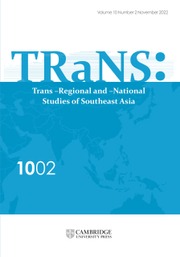The Paradox of the Thai Middle Class in Democratisation
Published online by Cambridge University Press: 13 January 2021
Abstract
The relationship of the bourgeoisie and democratisation has been inconsistent across the history of democracy. This work offers an alternative explanation taking the example of the Thai middle class, which had promoted democracy, turned against it. From the democratic transition of 1973 until the present day, the Thai middle class has played contradictory roles in the democratisation of the country. This work investigates the effects of democratic institution-building after regime change and the efforts to consolidate democracy in the middle class. This work proposes two major observations. The first is the failure of the middle class to establish themselves in democratic institutions and processes in either the legislature/executive, political parties, local government or structured interest groups. They have learned of the uncertainty of free elections and how the elected executives have benefitted other classes but not them. The second regards the missing prerequisite of democracy. Insufficient understanding of majority rules and two-turnover elections, caused the middle class who were disappointed with the outcome of democratic regimes and systems to easily turn away from democracy.
Keywords
- Type
- Original Article
- Information
- TRaNS: Trans-Regional and -National Studies of Southeast Asia , Volume 9 , Issue 1 , May 2021 , pp. 65 - 79
- Copyright
- Copyright © The Author(s), 2021. Published by Cambridge University Press on behalf of Institute of East Asian Studies, Sogang University.
References
- 4
- Cited by



